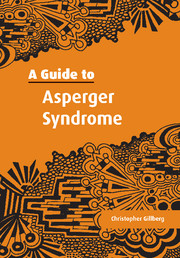Book contents
- Frontmatter
- Contents
- Preface
- 1 Introduction
- 2 Definitions
- 3 Prevalence
- 4 Symptoms in childhood
- 5 Symptoms in adolescence
- 6 Associated psychiatric and social problems
- 7 Other problems
- 8 Strengths
- 9 Background factors
- 10 Cognitive neuropsychology
- 11 Diagnosis and work-up
- 12 Outcome in the longer term: adults with Asperger syndrome
- 13 Attitudes, interventions and treatment
- 14 Who can help?
- 15 What about all those famous geniuses?
- 16 Case vignettes
- Appendices
- Further reading
- Index
4 - Symptoms in childhood
Published online by Cambridge University Press: 04 September 2009
- Frontmatter
- Contents
- Preface
- 1 Introduction
- 2 Definitions
- 3 Prevalence
- 4 Symptoms in childhood
- 5 Symptoms in adolescence
- 6 Associated psychiatric and social problems
- 7 Other problems
- 8 Strengths
- 9 Background factors
- 10 Cognitive neuropsychology
- 11 Diagnosis and work-up
- 12 Outcome in the longer term: adults with Asperger syndrome
- 13 Attitudes, interventions and treatment
- 14 Who can help?
- 15 What about all those famous geniuses?
- 16 Case vignettes
- Appendices
- Further reading
- Index
Summary
Asperger syndrome is usually congenital or arises on the basis of brain damage sustained during parturition or the first few years of life. Very rarely does it appear as a consequence of brain damage acquired later in life. It is common for symptoms not to become conspicuous until the child's fourth year or even later, and diagnosis is often not made until well into the school years.
In retrospect, it is often possible to get convincing descriptions of symptoms that were present already in the first two years of life. For the most part, these symptoms are subtle as compared with the rather more obvious problems encountered in classic autism. In a subgroup there is evidence of major social and communication deficits already in the first year of life. A diagnosis of autism may have been discussed or actually made in such cases. In yet other cases there is little or no evidence of symptoms before the child's third year. The symptoms that then emerge are often vague – or vaguely perceived/described – and the diagnosis rarely considered, much less made, in the early years.
It is not uncommon for children who are later diagnosed as having Asperger syndrome to have an early development reminiscent of or virtually identical to that seen in children with ADHD or DAMP (see chapter 2). There is a great degree of symptomatic overlap between cases with Asperger syndrome and cases with severe DAMP.
- Type
- Chapter
- Information
- A Guide to Asperger Syndrome , pp. 23 - 42Publisher: Cambridge University PressPrint publication year: 2002



